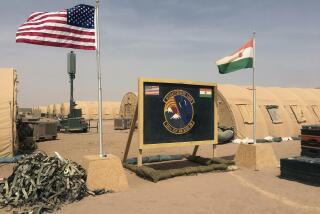U.S. Troops Hand Off Last Somali Area to U.N. Forces
- Share via
MARKA, Somalia — To a scratchy rendition of the national anthem and the wail of a Pakistani bagpipe brigade, the U.S. military operation to end starvation and restore hope in Somalia effectively came to an end Wednesday as the American forces turned over their last regional command to the United Nations.
The official change of command to a multinational U.N. peacekeeping force that will assume responsibility for the war-ravaged nation’s recovery will not take place until next Tuesday, at the earliest. That date, still unofficial, was recommended by U.S. and U.N. military commanders in Somalia.
But with just 6,650 American troops left in Somalia, most of them logistics specialists who will remain to assist the United Nations, and the final 1,000 U.S. Marine combat troops scheduled to leave for their home bases in Southern California by Friday, U.S. military commanders have left little more than the pomp and ceremony of the formal change of command.
All U.S. combat forces have been withdrawn from duty in Somalia, including the capital of Mogadishu, which was turned over to a Pakistani infantry brigade during a ceremony Monday at the U.S. Marine headquarters in the former U.S. Embassy compound.
And Wednesday’s change of command in Marka, a town on the Arabian Sea 100 miles south of Mogadishu, from the 1st Battalion, 22nd Regiment, of the U.S. Army’s 10th Mountain Division to the 1st Battalion, Sind Regiment, of the Pakistani army marked the last piece of U.S.-controlled territory in Somalia handed over to U.N. command.
“There are a few little things marginally at the edges that we’ll be taking care of in the next few days,” Col. Fred Peck, the Marine spokesman for the U.S.-led operation, told reporters Wednesday. “But come next week, it’s just a matter of saluting the new guys and passing the baton.”
For several weeks, Marine Lt. Gen. Robert B. Johnston, commander of the U.S. intervention force that once exceeded 25,000, has worked side by side with his Turkish replacement, Peck said. And U.S. ground troops in Mogadishu, Marka and elsewhere in the country have tried to walk the Pakistani forces through their patrol routines, weapons-confiscation techniques and rules of engagement in combat, he said.
Peck praised the transition as “transparent and seamless.” But it has not come without widespread concern and controversy.
Many international aid workers fear a new round of banditry and clan clashes as the still well-armed Somali factions test the resolve of Third World troops from nations such as Pakistan, Tunisia, Zimbabwe and Morocco, along with European forces from Belgium, France, Italy and Germany, after a period of relative stability under the U.S. Army and Marines.
And many Somalis fear that the change in command will mean abandonment of efforts led by the U.S. military to rebuild their police, their judicial system and their economy in a country where every trace of law and order disintegrated into anarchy during two years of civil war.
Marka symbolized those concerns Wednesday.
Before and after the speeches that accompanied the lowering of the American flag and the raising of the Pakistani crescent and star at a blown-out school compound that has served as the region’s command post, Somalis, aid workers and many of the American soldiers who have protected them voiced fears that Marka’s newfound security remains fragile.
U.S. Army Lt. Col. William J. Martinez, a Los Angeles native who has commanded the 625 American soldiers in the region for the past month, told the small crowd assembled for the ceremony: “I am proud to see that Marka has been a leader in the peaceful recovery of Somalia.” And he told his troops, “You can be proud in knowing that you have truly restored hope in Marka,” adding that he has “full confidence” in “the professionalism and expertise” of the Pakistani troops who will be replacing them.
But his replacement, Pakistani Lt. Col. Sher Akbar, spoke only in Urdu, Pakistan’s national language, and even the translation by a Pakistani officer was understood by few of the Somali elders and American officers in attendance. Akbar’s speech, heavily laced with Islamic overtones, also fueled concern in a town known for its small but growing Somali Islamic fundamentalist movement.
“A lot of the people in town are afraid that the Pakistanis are going to try to introduce their own brand of Islam here,” said one U.S. soldier who worked in the region. “And I’m afraid everything we’ve done here is going to start eroding pretty quickly after we leave.”
A British aid worker from the relief agency Oxfam, which has run feeding and health programs in the town, added: “We’re very sorry to see the Americans go. They’ve done a very good job here. I think the Pakistanis will be firm, but, well, in Somalia, you just have to play it day by day.”
And several soldiers and elders added that an assassination last week of one of the town’s traditional leaders is likely to spark a clan mini-war.
Lt. Col. Martinez, whose troops will remain in Somalia for four more months as the core of a 1,200-member quick reaction force charged with assisting the United Nations, added that the Somalis must look beyond both the United States and the United Nations.
“There’s only so much the United Nations can do,” he said. “The Somalis are going to have to do the rest themselves. How much help do we give them? I don’t know. How long do we stay? Heck, I’m not a politician. But I certainly see this as a long-term process.”
More to Read
Sign up for Essential California
The most important California stories and recommendations in your inbox every morning.
You may occasionally receive promotional content from the Los Angeles Times.













